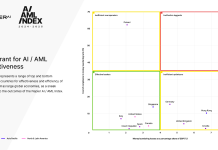In a significant announcement made in February, the Council of the European Union revealed that Frankfurt has won the competitive bid to host the Anti-Money Laundering Authority (AMLA), marking a pivotal moment for regulatory oversight within the EU.
The establishment of AMLA, scheduled to be operational by mid-2025, comes approximately four years after the European Commission initially proposed the creation of a new authority aimed at enhancing the anti-money laundering and countering the financing of terrorism (AML/CFT) framework in Europe.
Fenergo, which is helping to future-proof client lifecycle management, has explored what this means for the EU.
AMLA’s mandate will encompass both direct and indirect supervisory powers over high-risk financial entities, addressing the cross-border nature of financial crime with a unified approach.
AMLA’s responsibilities extend beyond member states’ supervision; it will directly oversee certain groups and entities, imposing sanctions where necessary. This broad mandate also includes involvement in non-financial sectors and the coordination of financial intelligence units (FIUs) across the EU.
The establishment of AMLA is poised to introduce significant regulatory shifts for financial institutions, coinciding with the EU’s single rulebook’s implementation in 2024. This harmonization effort aims to simplify cross-border trade and relationships, although challenges remain for regulated firms. The presence of AMLA is expected to encourage the adoption of modern technological solutions, moving away from potentially outdated or rigid practices.
The decision to select Frankfurt as AMLA’s headquarters came after a competitive bid involving nine EU member states. The selection process, likened to the Eurovision song contest’s voting system, involved rounds of voting by the EU Council and Parliament, marking a departure from the previously secretive selection processes for EU agency seats. This openness and the involvement of the European Parliament in the selection process underscore a new era of transparency and legislative involvement in the EU.
Frankfurt’s selection is emblematic of Germany’s commitment to leading AML and financial crime prevention efforts. Concurrently with AMLA’s establishment, Germany has been implementing fundamental AML reforms, spearheaded by the Federal Office to Combat Financial Crime (BBF). These reforms aim to prioritize the investigation of complex international money laundering cases. Frankfurt’s existing role as home to the European Central Bank (ECB) further accentuates its growing influence in the European financial sphere.
The choice of Frankfurt for AMLA’s headquarters is seen as a strategic move that will enhance the city’s attractiveness for foreign investment, especially for companies looking to engage with the agency’s decision-making processes. The move has been welcomed by industry leaders, with Fenergo expressing optimism about the centralized ecosystem’s potential to combat financial crime effectively.
Read the full story here.
Copyright © 2018 RegTech Analyst






